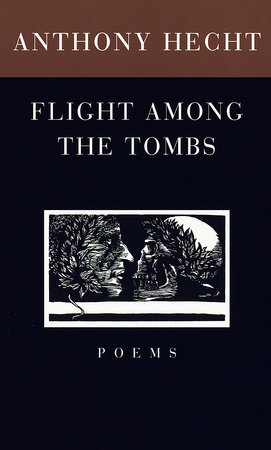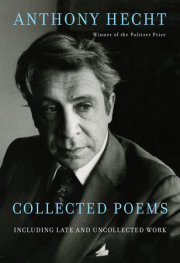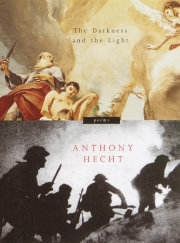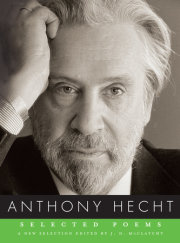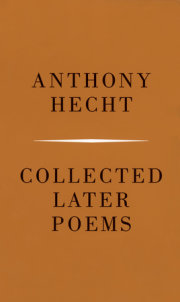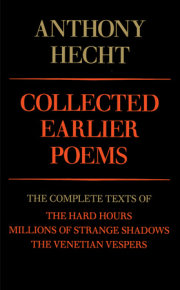"Death the Whore"
I
Some thin gray smoke twists up against a sky
Of German silver in the sullen dusk
From a small chimney among leafless trees.
The paths are empty, the weeds bent and dead;
Winter has taken hold. And what, my dear,
Does this remind you of? You are surprised
By the familiar manner, the easy, sure
Intimacy of my address. You wonder
Whose curious voice is this? Why should that scene
Seem distantly familiar? Did something happen
Back in my youth on a deserted path
Late on some unremembered afternoon?
And now you'll feel at times a fretful nagging
At the back of your mind as of something almost grasped
But tauntingly and cunningly evasive.
It may go on for months, perhaps for years.
Think of the memory game that children played
So long ago. A grownup brought a tray
Laden with objects hidden by a shawl
Or coverlet with fine brocaded flowers
Beneath which, like the roofs of a small city,
Some secret things lay cloaked. Then at a signal
The cloth was whisked away for thirty seconds.
You were allowed to do nothing but look,
And then the cover was replaced. Remember?
The tray contained bright densely crowded objects,
Sometimes exotic--a small cloisonne egg,
A candle-snuffer with an ivory handle--
But simple things as well. It never occurred
To any of the children there to count them;
You had been told simply to memorize
The contents of the tray. Each child was given
Paper and pencil to list what he recalled
And no one ever finally got them all;
Something always escaped. Perhaps a needle,
A gum eraser or a plastic ruler.
And so it is that now, as you're about
To eat or light a cigarette, something
Passes too swiftly before you can take aim,
Passes in furtive silence, in disguise,
Glimpsed only hazily in retrospect--
Like a clock's strokes recounted once they're done,
Never with confidence.
And now you're angry
At what you think of as my long digression
When in fact it's the eclipses of your mind,
Those sink-holes, culverts, cisterns long avoided
As dangerous, where the actual answer lies.
As for my indirection, I'll just say
I have more time than I know what to do with.
Let me give you a hint. The voice you hear
Is not the voice of someone you remember--
Or rather, it's that voice now greatly altered
By certain events of which you've partly heard,
Partly imagined, altogether feared.
Does that help? No, I didn't think it would.
Perhaps we can return another time
(A time when you're conveniently abstracted)
To the topic of my voice and of that smoke.
II
Much time elapses. (I could count the days;
You, for your part, have no idea how many.)
Today a color ad for undergarments,
Some glossy pages of
Victoria's Secret,Modeled by a young blonde catches your eye.
Nothing so vivid as a memory
Results. Perhaps a vague erotic sense,
A fleeting impulse down between your legs,
Stirs like a sleeping dog. Your mind begins
Its little, paltry Leporello's list
Of former girlfriends who pass in review
As images, stripped even of their names.
And then you linger upon one. It's me.
Don't be surprised. All that was long ago.
Your indolent thought goes over my young breasts,
Remembering, fondling, exciting you.
How very long ago that was. It lasted
Almost two years. Two mainly happy years.
In all that time, what did you learn of me?
My name, my body, how best to go about
Mutual arousal, my taste in food and drink
And what would later be called "substances."
(These days among my friends I might be called
"A woman of substance" if I were still around.)
You also learned, from a casual admission,
That I had twice attempted suicide.
Tact on both sides had left this unexplored.
We both seemed to like sex for the same reason.
It was, as they used to say, a "little death,"
A tiny interval devoid of thought
When even sensation is so localized
Only one part of the body seems alive.
And when you left I began the downhill slope.
First one-night stands; then quickly I turned pro
In order to get all the drugs I wanted.
My looks went fast. I didn't really care.
The thing that I'd been after from the first,
With you, with sex, with drugs, was oblivion.
So it was easy. A simple overdose
Knocked back with half a bottle of good Scotch.
In later years the rumors found you out
Through mutual friends. And somehow you remembered
That I had been disowned by my family.
My parents would have nothing to do with me
After they found I'd been a prostitute,
To say nothing of my trial suicides.
So, as you guessed, when I at last succeeded,
They acted as if I never had been born.
("Let the day perish ... ," as the scripture says.)
There was no funeral, no cemetery,
Nowhere for you to come in pilgrimage--
Although from time to time you thought of me.
Oh yes, my dear, you thought of me; I know.
But less and less, of course, as time went on.
And then you learned by a chance word of mouth
That I had been cremated, thereby finding
More of oblivion than I'd even hoped for.
And now when I occur to you, the voice
You hear is not the voice of what I was
When young and sexy and perhaps in love,
But the weary voice shaped in your later mind
By a small sediment of fact and rumor,
A faceless voice, a voice without a body.
As for the winter scene of which I spoke--
The smoke, my dear, the smoke. I am the smoke.
. All rights reserved. No part of this excerpt may be reproduced or reprinted without permission in writing from the publisher.

